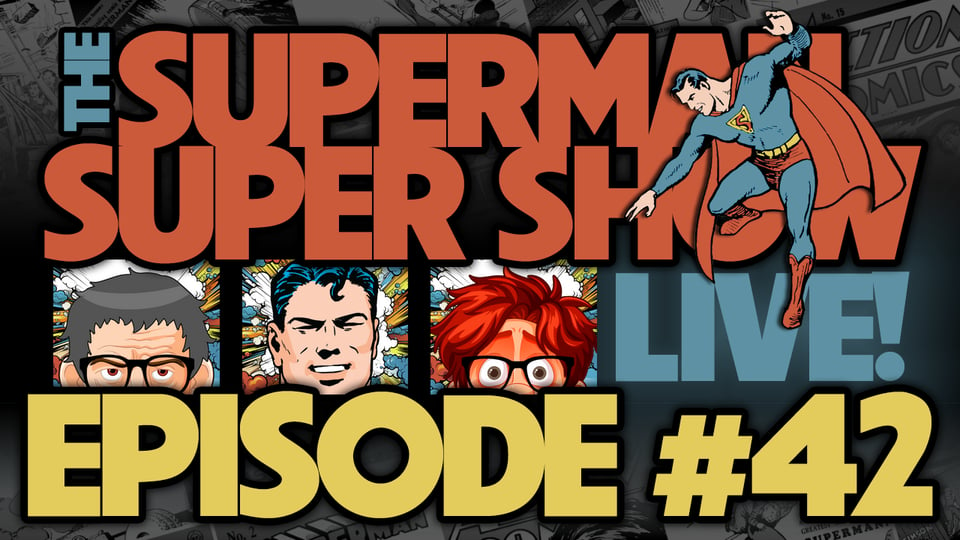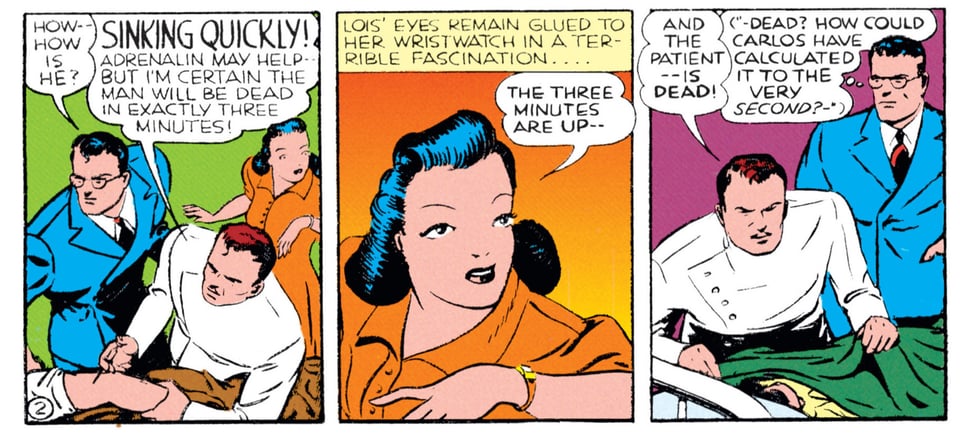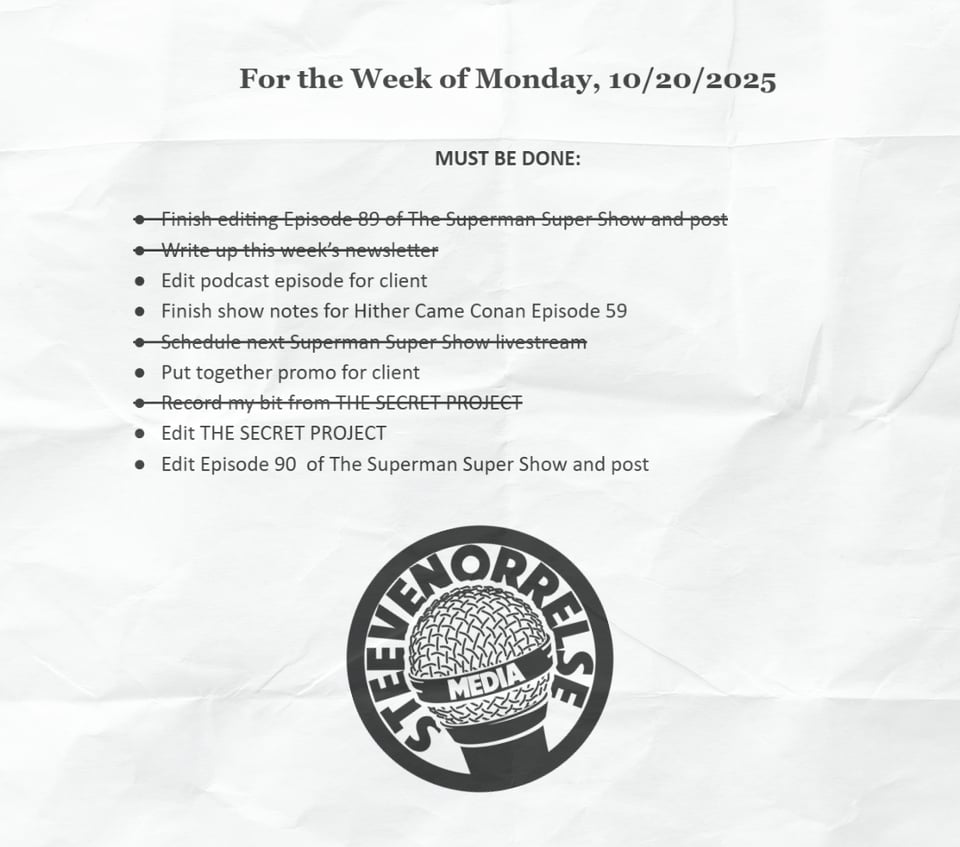Why I Forget You Exist (It’s Not Personal, I Swear)
Thank you for subscribing to Steeven Says Stuff, the newsletter dedicated to providing you with all the updates about me: Steeven R. Orr.
I’m a podcaster. I co-host The Superman Super Show with Ed Moore and I host Hither Came Conan, Growing Up Geek, The Comic Book Show, and so many more.
I’m also a husband, a father, a recluse, a writer, a neurodivergent, an introvert, a nerd, an expert at hyperbolization, and so much more!
Howdy!
This week’s newsletter is below.
THE INTRODUCTION BIT
Happy Thursday, everyone!
Do you ever feel like I’m ignoring you? Well, it isn’t on purpose and it’s not at all personal, and we’ll talk about it here in the Main Bit below.
But first:

The Superman Super Show Live Episode 42 has been scheduled for next Sunday, November, at 10:00 AM Central/Standard time.
This time around Ed and I will be looking at The The Yellow Plague, the third of four Superman stories in Superman 11 from 1941 and, like last week’s email, here’s a couple of panels from the story to get you all excited and stuff:

As always, you can watch live on YouTube and be a part of the action when you join the live chat and barrage us with questions and comments.
UPCOMING EPISODES
The Superman Super Show Episode 089
Action Comic #38 (1941)
Radio Control
Available everywhere on Monday, October 27, 2025
THE TO DO LIST

THE MAIN BIT - WHY I FORGET YOU EXIST
Like I said earlier, it’s nothing personal, but if I have people in my life that I don’t interact will on a regular basis, I can sometimes forget that they exist.
I know, it sounds horrible, but after doing a bit of research, I’ve learned that this might be due to a little something called Object Permanence.
So yeah, let’s talk about that.

Understanding Object Permanence
Object permanence originally refers to the developmental milestone when a child learns that things (and people) keep existing even when they’re out of sight. For most of us, this happens in infancy.
However, neurodivergent adults often describe a related experience: if something isn’t right in front of us, it can feel as if it “disappears” from our awareness. In practice, our brains know an object, task, or person still exists, but without a visible cue it’s very easy to lose track of it. This isn’t about not caring or pretending something vanished – it’s a real working-memory issue.
Object permanence means knowing things still exist even when hidden. Neurodivergent people often feel that when an item or task goes out of sight, it’s “out of mind.” For example, I might know I saved an email with feedback for an episode of Hither Came Conan, but later will have no recollection of where I saved it. I understand the email exists somewhere, yet without a clear reminder I simply forget to look for it.
Psychologically, it’s as if the email (or file, or even a person’s name) has ceased to exist in my mental map until something brings it back into focus.
Everyday Challenges (Out of Sight = Out of Mind)
Losing track of tasks and files: I frequently get emails or notes about my projects (like feedback for Hither Came Conan), but later I’ll “forget” I ever received them. In ADHD/ASD parlance, this is the classic “out of sight, out of mind.” It’s not that I don’t know the task exists; rather, without a cue my brain doesn’t keep it active in working memory. It’s not a failure of logic but a need for constant visual or audio cues to prevent myself from forgetting even familiar tasks.
Hidden items effectively vanish: Even something as simple as a saved document can become lost. It’s like the oft-cited “sandwich in the fridge” example: a person with autism might not remember a sandwich hidden behind other items, and similarly I might forget a file tucked away in a folder. If I organize things neatly, they sometimes feel too out of sight. In other words, if everything is neatly put away, I have no idea where anything is because I rely on seeing it.
People fall off the radar: I can go for weeks or months without checking in on friends I don’t see all that often. It’s not that I don’t care – it’s genuinely that they slipped from my active memory. Neurodivergent folks often need reminders or cues to keep in touch. For example, Rachael Green, who wrote the article ADHD Symptom Spotlight: Object Permanence (Why out of sight often means out of mind) over on Very Well Mind, describes needing an “elaborate system of social ‘cues’ and planning” just to remember distant friends, because otherwise her brain is “too distracted by whatever present activity or environment it’s in to remember”. Similarly, when friends and family are “out of sight,” I often forget birthdays, texts, and even just to check-in.
This feeling can be isolating. Neurodivergent people report that forgetting to reach out can strain relationships; loved ones may feel ignored even though the lapse isn’t intentional. In other words, our attention doesn’t mean “they don’t matter,” it’s just a quirk of how we process memory.
I mean, I still love my family and my friends, I still value them and value you, but if none of it is consistently front and center, it call all just simply can slip out of my memory.
Why It Happens: A Cognitive Perspective
Research suggests that these object‑permanence-like lapses come down to working memory and attention differences, not a literal belief that things cease to exist.
People with ADHD or autism often have a kind of “cluttered” working memory. Our brains can get overloaded by incoming stimuli, so if I’m doing one thing (say, cooking or scrolling social media), I literally don’t encode the other task (like pending emails) into memory. When I leave the kitchen, the boiling pot example applies: I know water boils, but once I’m elsewhere, everything else replaces that thought until I return.
Similarly, our brains can filter out reminders and make it hard to retrieve memories. In practice, that means the things not in the immediate foreground (email, file, person) just “drop out” of our active memory until some cue (like seeing the email or meeting the friend) brings them back.
This isn’t a sign of laziness or indifference. It’s a difference in neural processing. Even the label “object permanence” for adults is debated – some experts call it more of an executive function/working memory challenge.
What matters is understanding it’s real. If family or friends say “everyone forgets stuff, just try harder,” it can feel hurtful. In fact, neurodivergent individuals like me often feel relief to learn there’s a name (even if informal) for why we experience the world this way.
Coping and Support
Fortunately, there are strategies to manage these memory gaps. Setting strong reminders can help: for example, don’t open an important email until you can deal with it, or put key items in the same visible spot so you see them. Calendars and alarms are lifesavers – recurring calendar invites with pop-up alerts can prompt you to call friends or review feedback. Some neurodivergent people use visual cues everywhere: a photo of a friend on your wall to prompt a call, or an open notebook by the door for “to-do” items.
For me, I am all about the “to-do” list. I need that visual list of tasks that need to be completed, otherwise none of it would, or at least not on time.
It can also help to communicate openly. Let people know (if you’re comfortable) that you might need a nudge to stay in touch, and that forgetting is a brain thing, not a personal slight.
Above all, object permanence issues can be managed with awareness and support. Recognizing the pattern is the first step – once I see why I forget that email or drift out of contact, I can build reminders and ask for help checking in.
Remember, this is a common neurodivergent experience. It doesn’t mean I don’t care, only that I need creative cues to keep things on my radar.
THE ENDING BIT
That’s all folks, and don’t forget, I may forget that you exist, but it’s not forever, and it’s never personal.
Before I go, however, here’s quick reminder that donations aren’t just appreciated — they are desperately needed. If you’re able to help, anything is a lifeline.
Venmo: http://venmo.somanypodcasts.com/
Ko-Fi: http://ko-fi.somanypodcasts.com/
Thanks!
Steeven Says Stuff is a presentation of Steeven Orr Else Media. For a full list of all my nerdy podcasts, check out somanypodcasts.com.
I also invite you to join our subscription program, Steeven Orr Else Beyond, and in return, you'll get episodes of all podcasts under the Steeven Orr Else Media umbrella early and ad-free. Start your free trial today at beyond.steevenorrelse.com.